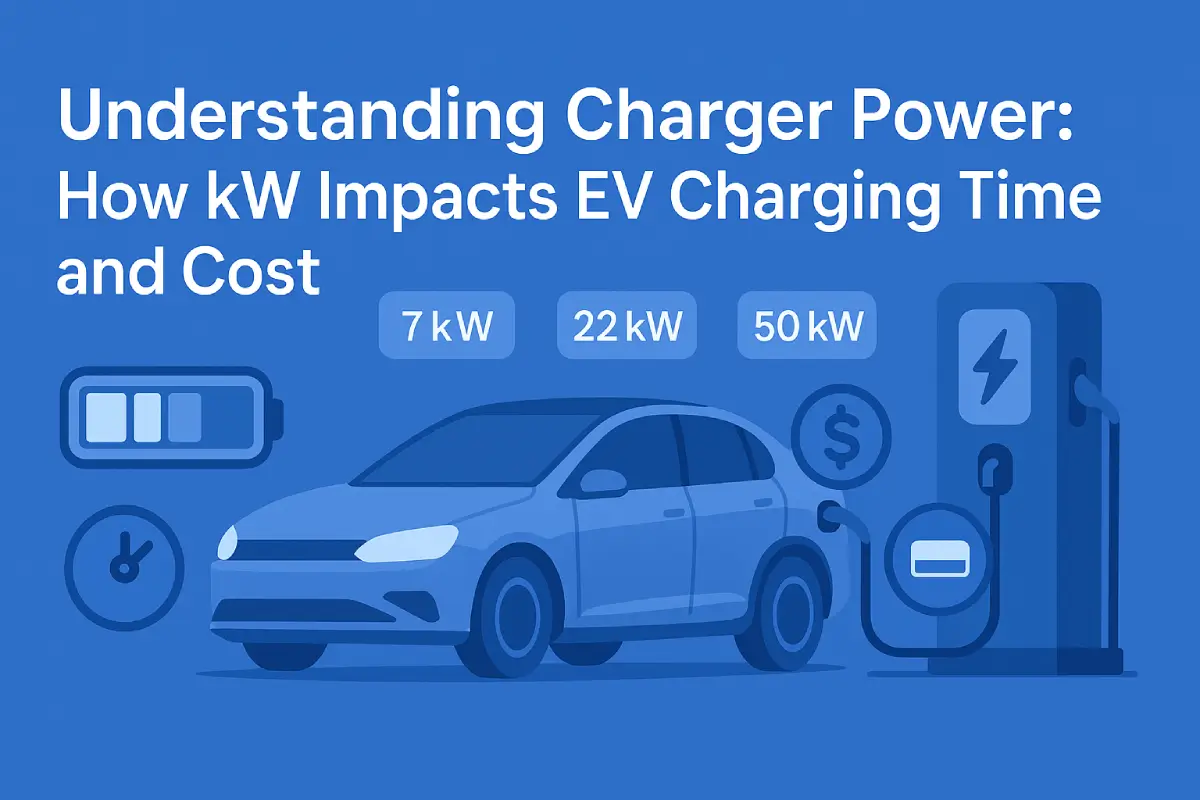Electric vehicle (EV) charging can be confusing—especially when it comes to charger power and how it affects your charging time and energy costs. In this article, we'll break down what charger power means, how it works, and how it directly influences your EV experience.
✅ Want to know how much your EV charging will cost? Try our free EV Charging Calculator
🔌 What Is Charger Power (kW)?
Charger power is measured in kilowatts (kW). It indicates the rate at which energy is delivered from the charger to your EV battery.
- kW (kilowatt) = Rate of charging (power)
- kWh (kilowatt-hour) = Amount of energy stored or consumed
For example, a 7 kW charger can deliver 7 kWh of electricity in one hour.
⚡ Types of EV Chargers by Power Level
Here's a breakdown of the most common charger types:
| Charger Type | Power Output (kW) | Charging Time (approx.) |
|---|---|---|
| Level 1 (Home) | 1.2 - 1.4 kW | 20-40 hours |
| Level 2 (Home/Public) | 7 - 22 kW | 4-8 hours |
| DC Fast Charger | 50 - 350 kW | 20-60 minutes |
The higher the kW, the faster your battery will charge—given that your car supports that input.
⏱️ How Charger Power Affects Charging Time
The formula is simple:
Charging Time = Battery Capacity (kWh) ÷ Charger Power (kW)
For example:
- A car with a 60 kWh battery on a 7 kW charger will take roughly 8.5 hours to fully charge.
- The same car on a 150 kW fast charger will charge to 80% in under 30 minutes.
💰 Cost Implications of Different Charger Powers
Charging cost depends on:
- Electricity rate per kWh
- Charging power (kW)
- Duration of charging
Example:
If your electricity cost is $0.15/kWh:
- Charging with 7 kW for 2 hours:
7 x 2 = 14 kWh → 14 x $0.15 = $2.10 - Charging with 50 kW for 0.5 hours:
50 x 0.5 = 25 kWh → 25 x $0.15 = $3.75
⚠️ Note: Fast chargers often have higher rates, sometimes up to $0.40/kWh.
🧮 Use Our EV Charging Calculator
Don't want to do the math manually? Use our simple, accurate tool to calculate:
- Charging time
- Charging cost
- Energy consumption based on power level
👉 Try our EV Charging Calculator here
🚘 Which Charger Power Is Right for You?
| Use Case | Recommended Charger Power |
|---|---|
| Overnight home charging | 7 kW (Level 2) |
| Occasional public charging | 22 kW |
| Long-distance travel | 150 kW+ DC Fast Charging |
For most daily commuters, 7-11 kW is ideal. If you travel long distances, investing in access to DC Fast Chargers can save significant time.
✅ Conclusion
Understanding charger power (kW) is key to managing your EV's charging efficiency and cost. Whether you're charging at home, at work, or on the go, the power of your charger plays a direct role in:
- Charging speed
- Total cost
- Battery health
💡 Take the guesswork out of it—use our EV Charging Calculator to find the best setup for your needs.
